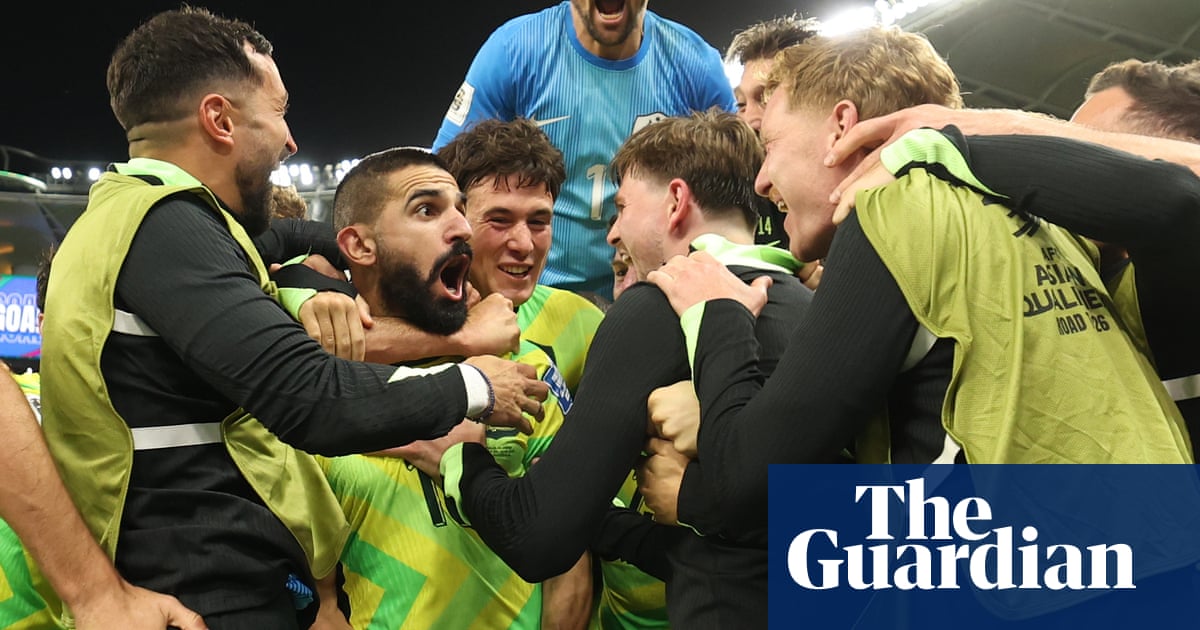At half-time of Australia’s 1-0 win over Japan,a smash-and-grab to end all smash-and-grabsthat all but punches their tickets to the 2026 World Cup, the Socceroos staff had a clear message for their players. They’d been handily outplayed to that point, lucky to get out of their own half let alone fashion something resembling a threat on their opponent’s goal, as a second-string Samurai Blue outfit dominated almost every meaningful statistic except the only one that mattered.
There was a feeling of disappointment over a perceived lack of toughness from the home side, a view that they were second best in every challenge, losing their duels and missing out on every second ball. But there was no sense of panic. “The coaches were just like, ‘stay calm’, keep moving it, keep moving it,” said Connor Metcalfe. “And if we have to score in the 90th minute, then we have to score in the 90th minute.”
Call it coincidence, precognition or divine intervention, but it was the 90th minute when Riley McGree turned Ayumu Seko and got to the byline to cut the ball back for Aziz Behich, who met the ball and sent it beyond Kosei Tani and into the back of the net. In one split second, a battling draw became a miraculous win, and the sins of the previous 90 minutes were washed away in euphoria. It wasn’t pretty, nor was it particularly fun, but now, Tony Popovic’s side will board a flight to Jeddah knowing that anything short of disaster in their clash with Saudi Arabia on Tuesday will remove any qualifiers from their accomplishment.
Keeping alive their incredibly faint hopes of supplantingAustraliawith a 2-0 win over Bahrain later on Thursday evening, Saudi Arabia will welcome the Socceroos to the King Abdullah Sports City Stadium three points behind them in Group C, sitting in third place and staring up at their opponents in the second of two automatic qualification slots.
To replace them, Hervé Renard’s side would not only need a win to draw level on points – the Socceroos have lost just once during this phase of qualification, and are yet to have done so under Popovic – but they will also need to overcome an eight-goal differential; Australia currently sit at +8 with the Saudis back at 0 following their win. As goals scored serves as the third tiebreaker in qualifying – and the Socceroos have scored 14 times across their nine games compared to the six of the Saudis – drawing level with a 4-0 win wouldn’t be enough either; Saudi Arabia would have to win 5-0.
Here it is important to note that nothing can be taken for granted in football. Few would have anticipated that Inter would lose 5-0 to PSG in last week’s Champions League final until the petrodollar-backed Parisians swept them aside. And Popovic, while in a good mood, wasn’t allowing himself to get too carried away on Thursday, noting that the press pack would still have to write “all but” qualified for now. But for all their foibles in possession and an inability to match either the technique or physicality of Japan on Thursday, the one thing the Socceroos have been able to do very well over the years is defend. And, as one would expect, this has only heightened under Popovic.
Sign up toFootball Daily
Kick off your evenings with the Guardian's take on the world of football
after newsletter promotion
For all the weight of territory and possession they were able to accumulate at Optus Stadium, Japan were lacking actual, clear-cut chances. Of the 13 shots they had on Thursday, just the one – a first-half effort from Yū Hirakawa that was comfortably saved by Maty Ryan – was on target. Yuito Suzuki drove forward in the 28th minute and bend a shot wide, and Takefusa Kubo caused all sorts of problems when he came on – highlighted by an 80th-minute attempt in which he sold candy to three defenders before shooting just wide on his non-preferred foot – but the backline of Miloš Degenek, Cameron Burgess and Alessandro Circati held firm.
For Circati, making his first appearance for the national team since he ruptured his ACL last September and playing in his native Perth, the emotion of the win and what it meant almost overcame him post-game. The 21-year-old had somehow found the energy to be one of five Australians advancing into the penalty area to present for McGree’s cross and was amongst the first on hand to celebrate with Behich, who netted just his third international goal 4,561 days after his only other two goals for Australia. Brought on as a second-half substitute, McGree – who has been restricted to just three appearances with Middlesbrough in 2025 due to successive injuries – didn’t even have the energy to celebrate the goal properly.
It was uncannily reflective. It was unlikely, it was a slog, and they suffered. But just as their coach had predicted, the Socceroos found a way.
